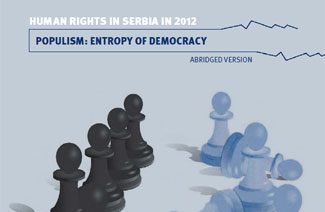 |
The Helsinki Committee has recently issued its
13th annual report on the situation of human rights in Serbia
against the backdrop of political, economic and social developments.
Human rights are still overshadowed by xenophobia: after years and
years of incriminated institutions and disastrous policies one can
hardly expect see a closed society transformed and civilized in the
short run. This is the more so since the new government – emerged
from the Milosevic’s regime and warring policies - is itself at the
stage “self-taming” and adopting new standards of behaviour.
“Though formed a year ago, the Serbian government
is still at the beginning – it has not yet adopted a systemic
program or strategy. |
|
The structures in power are practically in a
permanent election campaign…The predominant populism that promotes
Vice-Premier Vucic in the first place is best exemplified by the
arrests within the “anti-corruption campaign” and the
“socially-oriented” budget for the year 2013… What marks domestic
policy, except for populism, is a strong resistance to
Europeanization and modernization, regardless of the changed
rhetoric and the agreement signed with Prishtina.. Populism is
nothing but one of manifestations of Serb nationalism that persists
as the only ideology…One cannot deny that some governmental steps –
such as negotiations with Prishtina – were positive. But only the
implementation of the agreement will show whether or not the
government signed it in good will.”
These are some of conclusions of the introductory
section of the report published under the title “Populism: Entropy
of Democracy.” This section also point out:
“The democratic opposition and civil society
organizations do not respond promptly and adequately to the state of
affairs: they are either tired out and disappointed, and take
uncoordinated actions or irresponsible, corrupt and prioritize
personal or group interests over the country’s modernization…The
process of accession to EU is crucial for Serbia regardless of all
the criticism of EU for its ongoing crisis. This is the only way for
Serbia to establish the rule of law and stabilize its institutions,
as testified by all earlier cases of the countries acceding EU.”
Apart from recommendations to European Union,
Serbia’s government and civil society, and the opening chapter
titled “Human Rights in the Shadow of Xenophobia,” the Committee’s
600-odd-page annual report examines the areas that are grouped in
the chapters: “Judiciary,” “Security System,””Parliament,”
“Independent Agencies,” “Economic Situation,” “Religious
Communities,” “Discrimination,” “Media,” “Decentralization vs.
Centralization,” “Kosovo,” “Serbia and Neighboring Countries” and
“Serbia and the World.”
These are the topics to be presented in more
detail on Monday, July 8, 2012 at 11:00 a.m. in the Media Center,
Belgrade.
The 2012 annual report was issued with the
assistance from the Royal Netherlands Embassy in Belgrade. The
edition is available at www.helsinki.org.rs., while some copies can
be obtained at the Committee’s office.
The abridged version in English will be publicized
online and available at the organization’s website by the end of
July 2012.
Belgrade, July 5, 2012
Acrobat PDF (1.39mb) >>> |
